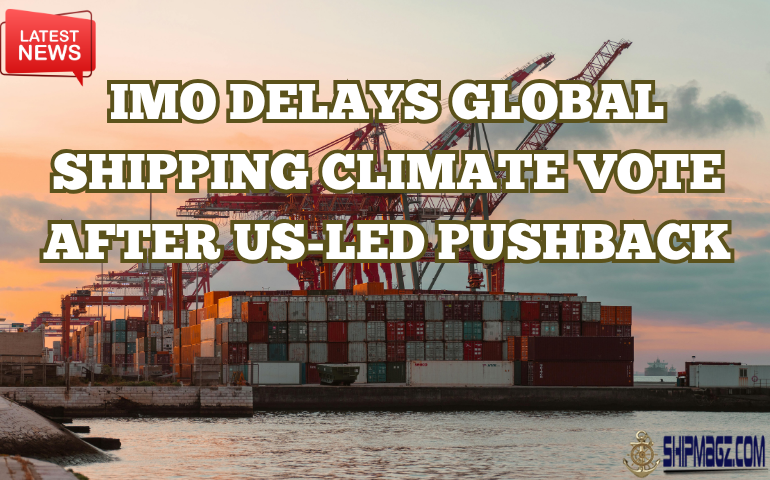IMO delays global shipping climate vote after US-led pushback

Background & Framework Goals
The IMO’s Net-Zero Framework (NZF) was designed as part of its 2023 greenhouse-gas strategy, aiming to lead the global shipping industry to net-zero emissions by 2050.
Key elements included:
- A global fuel standard requiring ships above 5,000 gross tonnes to reduce fuel carbon intensity across the full supply chain (“well-to-wake”).
- A carbon-pricing mechanism rewarding vessels using zero- or near-zero-emission fuels and enabling trade in surplus emission credits.
Decision & Voting Outcome
On 17 October 2025, during an extraordinary session of the IMO’s Marine Environment Protection Committee (MEPC) in London, the decision was taken to delay the vote.
The voting result was:
- 57 member states voted in favour of postponement
- 49 opposed
- 21 abstained
The original entry-into-force date of March 2027 is now pushed back by at least one year, with MEPC expected to reconvene in October 2026.
Reasons for Delay
Strong lobbying from the United States, which reportedly threatened trade and visa repercussions for countries backing the framework, played a key role.
In addition, oil-producing nations including Saudi Arabia sought to change decision-making procedures to require explicit approval, adding procedural obstacles.
Industry Reaction
The postponement was met with disappointment across the maritime sector. The European Community Shipowners’ Associations (ECSA) called it “regrettable” as it undermines investment certainty for clean-fuel production.
The International Chamber of Shipping (ICS) warned that the lack of clarity hinders decarbonization investment.
Some stakeholders cautioned that the delay raises the risk of regional regulatory fragmentation — for example through expanding the EU Emissions Trading System (ETS) — rather than a unified global regime.
Implications
- The delay creates a period of uncertainty for shipowners and fuel-producers about future regulatory requirements, potentially slowing shifts to low- and zero-carbon fuels.
- The move may encourage regional schemes to move ahead faster, reducing the impetus for a single global standard.
- With shipping responsible for more than 85 % of global maritime emissions (for vessels above 5,000 t), delaying global regulation could hamper progress towards the 2050 target










